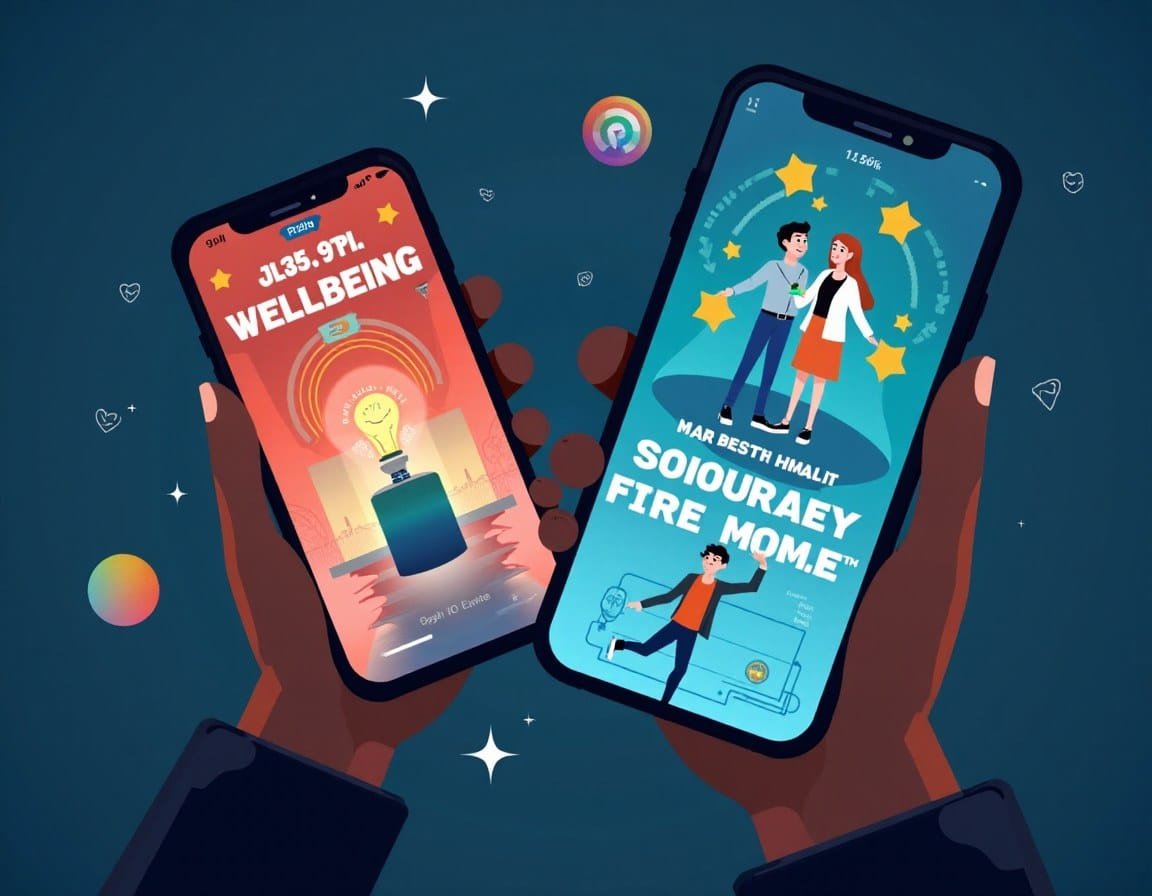Mindfulness and Mental Health Apps: Top 10 Trends Revolutionizing Digital Wellbeing in 2025

Are Digital Mental Health Apps the Key to Unlocking a Happier You, or Just a Band-Aid for a Broader Problem? As we navigate the complexities of modern life, it’s no secret that our mental wellbeing is more crucial than ever. With the rise of digital technologies, Digital Mental Health Apps have become increasingly popular tools for managing stress, anxiety, and other mental health concerns. But do these apps truly offer a solution to our collective wellbeing woes, or are they just a temporary fix? In this article, we’ll delve into the world of Digital Mental Health Apps, exploring the top mindfulness and self-care tools that can help you cultivate a happier, healthier you. From meditation and mood-tracking to social support networks and cognitive behavioral therapy, we’ll examine the latest trends and innovations in digital mental health, providing you with valuable insights and practical advice for prioritizing your wellbeing in today’s fast-paced world.
What is Digital Mental Health Apps?
Digital Mental Health Apps are mobile applications designed to support mental health through various features such as meditation, mood tracking, cognitive behavioral therapy (CBT), and social support networks. These apps aim to provide accessible and convenient tools for individuals to manage their mental wellbeing.
1. Personalized Mental Health Solutions
One of the most significant trends in Digital Mental Health Apps is the move towards personalized mental health solutions. These apps use artificial intelligence (AI) and machine learning to tailor content and recommendations based on individual user data. This personalization ensures that users receive the most relevant and effective support for their unique mental health needs.
2. Integration with Wearable Technology
The integration of Digital Mental Health Apps with wearable technology is another trend revolutionizing digital wellbeing. Wearables such as smartwatches and fitness trackers can monitor physiological indicators like heart rate and sleep patterns, providing valuable data that apps can use to offer more accurate and timely mental health interventions.
3. Virtual Reality (VR) Therapy
Virtual reality (VR) therapy is becoming increasingly popular in the realm of Digital Mental Health Apps. VR environments can simulate real-world scenarios, allowing users to practice coping strategies in a controlled and safe setting. This immersive experience can be particularly beneficial for treating conditions like PTSD and anxiety disorders.
4. Gamification of Mental Health
Gamification is a trend that involves incorporating game-like elements into Digital Mental Health Apps to make mental health management more engaging and enjoyable. Features such as rewards, challenges, and progress tracking can motivate users to stick with their mental health routines and achieve their wellbeing goals.
5. Community and Social Support
Many Digital Mental Health Apps are now focusing on building communities and social support networks. These platforms allow users to connect with others who are experiencing similar mental health challenges, providing a sense of belonging and mutual support. This social aspect can be incredibly beneficial for individuals who may feel isolated or alone in their struggles.
6. Teletherapy and Digital Counseling
Teletherapy and digital counseling are becoming more accessible through Digital Mental Health Apps. These services allow users to connect with licensed therapists and counselors from the comfort of their own homes. This convenience can make it easier for individuals to seek professional help and maintain regular therapy sessions.
7. Focus on Preventative Care
Preventative care is a growing focus in the development of Digital Mental Health Apps. These apps aim to provide tools and resources that help users maintain their mental health and prevent the onset of more severe mental health issues. Features such as stress management techniques, mindfulness exercises, and educational content can empower users to take proactive steps towards their mental wellbeing.
8. Enhanced Data Privacy and Security
As the use of Digital Mental Health Apps continues to grow, so does the importance of data privacy and security. Developers are implementing advanced encryption and security measures to protect user data and ensure that personal information remains confidential. This focus on privacy can help build trust and encourage more individuals to use these digital tools for their mental health needs.
9. Multi-Platform Accessibility
Multi-platform accessibility is another trend in the world of Digital Mental Health Apps. These apps are being designed to work seamlessly across various devices, including smartphones, tablets, and computers. This flexibility allows users to access their mental health tools and resources whenever and wherever they need them.
10. Collaboration with Healthcare Providers
Collaboration with healthcare providers is a crucial trend in the development of Digital Mental Health Apps. By working closely with medical professionals, app developers can ensure that their tools are evidence-based and clinically effective. This collaboration can also facilitate the integration of digital mental health solutions into traditional healthcare settings, providing a more comprehensive approach to mental wellbeing.
How Effective Are Digital Mental Health Apps?
Research has shown that Digital Mental Health Apps can be highly effective in managing various mental health conditions. Studies have found that these apps can reduce symptoms of anxiety, depression, and stress, and improve overall mental wellbeing. However, it’s important to note that the effectiveness of these apps can vary depending on the individual and the specific features of the app.
Choosing the Right Digital Mental Health App
With so many Digital Mental Health Apps available, choosing the right one can be overwhelming. Here are some tips to help you find the best app for your needs:
- Identify your specific mental health goals and needs.
- Look for apps that offer personalized content and recommendations.
- Check for user reviews and ratings to gauge the app’s effectiveness.
- Ensure that the app has robust data privacy and security measures.
- Consider apps that offer additional features such as teletherapy or community support.
Conclusion
As we move into 2025, the landscape of Digital Mental Health Apps continues to evolve, offering innovative and effective solutions for managing mental wellbeing. From personalized mental health solutions and VR therapy to gamification and community support, these apps are revolutionizing the way we approach mental health. By staying informed about the latest trends and choosing the right app for your needs, you can take proactive steps towards a happier, healthier you.
Additional Resources
For more information on mindfulness and mental health apps, visit CalmTech-Life.com and Mindfulness and Mental Health Apps. Follow and subscribe to stay updated on the latest trends and innovations in digital mental health.
“`






